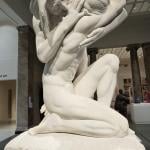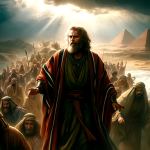Shakespeare’s two tetrologies on English history trace the shift from a sacrally based political order (Richard II) to a “Machiavellian” one (Richard III). That is the sequence of actual history. But the sequence of Shakespeare’s composition is different. Shakespeare wrote the historically later tetrology (2 Parts of Henry VI and Richard III) first, and then followed with the second (Richard II, 2 Parts of Henry IV, Henry V). Henry V is, in terms of order of composition, the climax of Shakespeare’s English history plays.
What do we make of this? Is Henry V the perfect modern secular ruler? Or is he somehow a combination of the best of both the sacral politics of the Middle Ages and the secular politics of the modern period? It seems that the soliloquies tell all. We know how calculating Richard III is because we overhear his thoughts in his soliloquies (especially that in 3 Henry VI, Act 3, scene 2, where he describes himself as a political chameleon, Proteus, and a Machiavel.) What do Henry’s soliloquies reveal? A king who is conscious of the sins of his father, who pleads with God for mercy, who meditates profoundly on kingship. Henry definitely has his Machiavellian side; he play-acts with Falstaff in order to impress England with his sudden reformation. But if the soliloquies reveal the man as he is, then those Machiavellian tricks are subordinated to a vision of Christian kingship.











